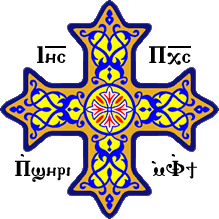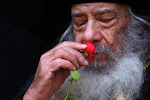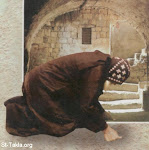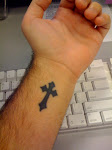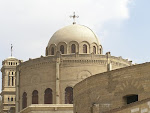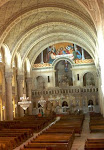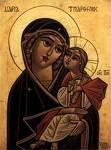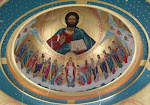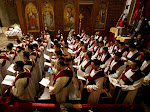Bliss. Or at least that’s what they tell me. And maybe that’s the case in certain scenarios, but not all of them. Take growing up, for example. How do you know what you are going to be if you don’t know where you came from? Ignoring your roots, or simply not knowing them at all, affects the foundation that you build your life upon—because there simply is no foundation without roots.
In the two years of working with the high school youth group at my church and four years attending the “Primetime” College Friday Night meetings, I have probably heard every Arab joke there is. From extremely late arrivals to any and all events—“there is no discrimination on what we are late for, we're just late for everything,” they say—to the typical arrogant egos of Arab males to gossiping mouths of Arab women. Of course, these examples are only jokes and not meant to include every single person of Arab descent. What saddens me, however, is that the youth group as well as the majority of college students at our church includes us in the ethnic category of “Arab.”
We are Copts. We are Egyptian. We are North African. I will even go so far as to call us Middle Eastern, even though that is a term invented in the 1950’s and we have been around much, much longer than that—but one thing we are not is Arab.
Depending on who you talk to, depends on the criteria used to decipher an Arab from a non-Arab. Many people use the criteria of language. If the country’s national language speaks Arabic, then you must be an Arab. If we apply that logic to other countries, then that means Americans are really English, right? Or that Mexicans are Spanish? Of course we all know better than that. People of America speak English, but they are Americans. Mexicans speak Spanish, but God help you if you call them Spanish to their face. Englishmen are from England and the Spanish are from Spain and although they share the connection of language to those in different countries, it does not change the ethnicity of the people.
Furthermore, the languages of these once colonized countries have become a colloquial, bastardized version of their origin. The English would use words like “lift, petro, and mobile,” where as Americans would say “elevator, gas, and cell phone,” respectively. The Arabic spoken in Egypt is no exception to that rule. Egyptian Arabic, although the most widely understood dialect of all the Arabic-speaking countries, have developed miles of differences to that of the more formal Modern Standard Arabic.
When I met Gregory Orfalea, author of The Arab Americans: A History, two years ago at a teacher’s workshop in Georgetown University, I asked him about his criteria. We exchanged the typical Arabic greetings and pleasantries as he prepared his answer—immediately recognizing my Egyptian Arabic. He insinuated that it was all relative, but he agreed with the majority of the world to decipher Arab ethnicity by language—with a few exceptions. He asked if I was Coptic Orthodox and I showed him my cross tattoo on my wrist—a significant identification of a Coptic Christian. “If we looked at it in the genealogical sense,” he said, “then of course the Coptic people are not Arab because they have no origins in the Arabian Peninsula.”
Let’s take a deeper look at the principle of genealogy. At one point, shortly after the ascension of Christ, Coptic Orthodoxy was the majority religion of Egypt. The national language was Coptic, not Arabic. Also, the ethnicity of the Egyptian people were called Copts; hence the reason why Copts are considered an ethno-religious group. Then in 641AD, the Copts encountered the Arab-Muslim Invasion. They were given three options: convert, pay the Jizya—a special tax to stay Christian, or death. Many could not afford the tax, so they either converted to Islam or died for their faith. In addition, the Arabs also enforced their language by banning the use of the Coptic language in public. Although Coptic is one of the major languages spoken in the liturgy, very few people can have a conversation in that tongue.
For those who still consider Egyptians to be Arabs, let me ask this question: is it possible for a nation to invade and conquer their own people? Of course not; there is nothing to conquer when it already belongs to that nation.
I am not suggesting that Copts are above the Arabs. After all, we are late everywhere we go—to the extent that if we are fifteen minutes late by American standards, we’re at least a half hour early by Egyptian standards. Most Egyptian men are sweet but abundantly arrogant, and many of the women love to spread the juicy gossip. I simply want to untangle this misunderstanding that many of our Coptic youth seem to possess. Maybe then, they will take more pride in being something so exotic that the average person in America has yet to understand.
Wednesday, September 30, 2009
Saturday, September 19, 2009
Our Bittersweet, Joyous Holiday
Americans’ hear the phrase September 11th—or 9/11: the more popular term—as the day that Al-Qaeda terrorists hijacked several planes that crashed into the Twin Towers of the World Trade Center in New York City and the Pentagon in Northern Virginia, killing almost three thousand people. It was a time of fear, uncertainty, and heartbreak. It was a time when every single person in the nation dialed numbers of loved ones to only get a perpetual busy single. It was a time when all eyes were mesmerized by breaking news delivered by the frantic anchormen.
But September 11th meant something else to the Coptic community other than a day of mourning. It was a day of celebration: The Feast of the Nayrouz. The Nayrouz serves both as the Coptic New Years Day and the feast and commemoration of the martyrs of the Church. Due to the persecution lead by Diocletian, the most brutal persecution delivered by the Roman Empire against Christians, the Coptic Orthodox Church decided to start the Coptic Year beginning the day that Diocletian took the throne in 284AD.
I know, it sounds morbid to joyously celebrate the murder of so many members of the congregation by those who hated and despised us. However, the Coptic Church is known as “the Church of the Martyrs.” According to History of the Church by modern historian Butcher, she states: “if in the world there were six wonders, then the seventh and greatest wonder would be the Coptic Orthodox Church. For despite the many attempts to remove it, and destroy it, and the thousands of martyrs it has presented so that their blood went up to the knees of the horses, yet it has remained steadfast, spread and grown.”
We embrace those who were strong enough to look death in its multiple faces—a metallic tip of a sword or a black barrel of a gun—and proclaim their love for Christ, knowing that action is the greatest tangible love of all: dying for someone you love. We intercede to them and learn about their stories to inspire us to have a better relationship with God.
And in Egypt, they live that reality every day.
The daily persecution of our Coptic brothers and sisters in the motherland comes in many forms. In Upper Egypt, it’s more common to hear of kidnappings, tortures and murders, and forced conversions to Islam. In Lower Egypt, it’s more common to persecute through the death of your career. When an employer sees on your identification card that you are Christian, or simply hearing your name and knowing that your name could be nothing else but Christian, you will be denied that promotion you deserved; or that prominent position you interviewed for. It’s as guaranteed as oxygen in the air.
Take my father for example. My father, the valedictorian of his high school, went off to college and for three years had optimum grades to get an assistantship in his university, which would lead to becoming a professor—a rather prestigious position in Egypt. Magically in his fourth year, when you are picked for assistantships, his overall grades dropped. Not by his means, but somewhere between his graded exams and the filing cabinet, his grades lowered just enough for him to be ineligible for an assistantship. Coincidence? Ha, nice try.
If anyone needs the reminder of the Feast of the Nayrouz, it’s us who live in the Diaspora. Because, let’s face it: living in America where your average decision making skills are tested by whether you’re going to add whip cream, extra syrup, or switch to nonfat milk for your five dollar Starbucks coffee doesn’t test your faith. Neither does sitting outside at two o’clock in the morning on Black Friday to get the iTouch or the latest Wii game. Living the life in the land of the free and the home of the brave has spoiled our outlook on life.
But then again, eight years ago on the very day we are to celebrate our martyrs, America faced a fear so paralyzing that all we could do was lay our head in our hands and pray. I hope that our community can look at both significant events of 9/11 and embrace a relationship with God that we couldn’t have had before.
But September 11th meant something else to the Coptic community other than a day of mourning. It was a day of celebration: The Feast of the Nayrouz. The Nayrouz serves both as the Coptic New Years Day and the feast and commemoration of the martyrs of the Church. Due to the persecution lead by Diocletian, the most brutal persecution delivered by the Roman Empire against Christians, the Coptic Orthodox Church decided to start the Coptic Year beginning the day that Diocletian took the throne in 284AD.
I know, it sounds morbid to joyously celebrate the murder of so many members of the congregation by those who hated and despised us. However, the Coptic Church is known as “the Church of the Martyrs.” According to History of the Church by modern historian Butcher, she states: “if in the world there were six wonders, then the seventh and greatest wonder would be the Coptic Orthodox Church. For despite the many attempts to remove it, and destroy it, and the thousands of martyrs it has presented so that their blood went up to the knees of the horses, yet it has remained steadfast, spread and grown.”
We embrace those who were strong enough to look death in its multiple faces—a metallic tip of a sword or a black barrel of a gun—and proclaim their love for Christ, knowing that action is the greatest tangible love of all: dying for someone you love. We intercede to them and learn about their stories to inspire us to have a better relationship with God.
And in Egypt, they live that reality every day.
The daily persecution of our Coptic brothers and sisters in the motherland comes in many forms. In Upper Egypt, it’s more common to hear of kidnappings, tortures and murders, and forced conversions to Islam. In Lower Egypt, it’s more common to persecute through the death of your career. When an employer sees on your identification card that you are Christian, or simply hearing your name and knowing that your name could be nothing else but Christian, you will be denied that promotion you deserved; or that prominent position you interviewed for. It’s as guaranteed as oxygen in the air.
Take my father for example. My father, the valedictorian of his high school, went off to college and for three years had optimum grades to get an assistantship in his university, which would lead to becoming a professor—a rather prestigious position in Egypt. Magically in his fourth year, when you are picked for assistantships, his overall grades dropped. Not by his means, but somewhere between his graded exams and the filing cabinet, his grades lowered just enough for him to be ineligible for an assistantship. Coincidence? Ha, nice try.
If anyone needs the reminder of the Feast of the Nayrouz, it’s us who live in the Diaspora. Because, let’s face it: living in America where your average decision making skills are tested by whether you’re going to add whip cream, extra syrup, or switch to nonfat milk for your five dollar Starbucks coffee doesn’t test your faith. Neither does sitting outside at two o’clock in the morning on Black Friday to get the iTouch or the latest Wii game. Living the life in the land of the free and the home of the brave has spoiled our outlook on life.
But then again, eight years ago on the very day we are to celebrate our martyrs, America faced a fear so paralyzing that all we could do was lay our head in our hands and pray. I hope that our community can look at both significant events of 9/11 and embrace a relationship with God that we couldn’t have had before.
Thursday, September 10, 2009
2nd-Generation Immigrants, Lend Me Your Ears!
Here's the million dollar question, are you ready for it? When you're a second-generation immigrant, how American can you be without losing yourself? I mean, what's the give and take? What are you willing to lose from your heritage to assimilate into the average American twenty-something?
My answer: very little. I am Egyptian, and yes, I am related to the pharoahs. But most importantly, I'm Coptic Orthodox. Americans' lack of knowledge and familiarity with us--unless you are a theologian, that is--has caused this 2nd generation immigrant to hold tight to her religion, culture, and ethics.
I can't say the same for all Copts in America though. Some are tired by the typical questions (So, where are you from? Egypt, huh? So you're Muslim? No? Coptic Orthodox, what's that?) and hide behind the American facade.
However, at the beginning and end of every day I have to look at myself in the mirror. And I wouldn't be able to if I ignored my Coptic complexion.
But I would be lying to myself if I didn't admit to being somewhat affected by being born on US territory (I'll give you a hint: it's the land of sex, drugs, and reggae) and raised in a suburban area in the States. I guess what I'm trying to figure out is who I am.
If you want to check out a film that explores the same difficulties of identity and assimilation, I highly recommend renting The Namesake. It's about an Indian family, not Coptic, but Kal Penn and Irfan Khan give remarkable performances. Until I can figure out how to embed a video here, please check out the trailer at: http://www.youtube.com/watch?v=_sOaA-4Y8tI
My answer: very little. I am Egyptian, and yes, I am related to the pharoahs. But most importantly, I'm Coptic Orthodox. Americans' lack of knowledge and familiarity with us--unless you are a theologian, that is--has caused this 2nd generation immigrant to hold tight to her religion, culture, and ethics.
I can't say the same for all Copts in America though. Some are tired by the typical questions (So, where are you from? Egypt, huh? So you're Muslim? No? Coptic Orthodox, what's that?) and hide behind the American facade.
However, at the beginning and end of every day I have to look at myself in the mirror. And I wouldn't be able to if I ignored my Coptic complexion.
But I would be lying to myself if I didn't admit to being somewhat affected by being born on US territory (I'll give you a hint: it's the land of sex, drugs, and reggae) and raised in a suburban area in the States. I guess what I'm trying to figure out is who I am.
If you want to check out a film that explores the same difficulties of identity and assimilation, I highly recommend renting The Namesake. It's about an Indian family, not Coptic, but Kal Penn and Irfan Khan give remarkable performances. Until I can figure out how to embed a video here, please check out the trailer at: http://www.youtube.com/watch?v=_sOaA-4Y8tI
Labels:
americanization,
assimilation,
coptic orthodox,
copts,
identity,
the namesake
Subscribe to:
Posts (Atom)
